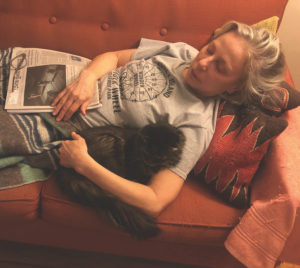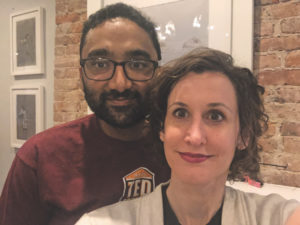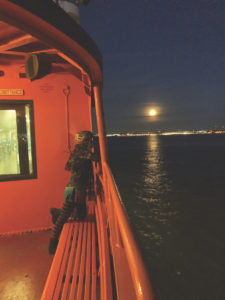This week, the Independent offers dispatches from readers with a strong Cape connection who are living in other areas of the U.S. that are currently the hardest hit — places we hear about and think about daily.

Manhattan
Eve Becker, a writer and teacher, lives on the Upper West Side with her boyfriend and 20-year-old cat. Her 89-year-old mother lives a mile and a half away, her son about a mile uptown. Becker has visited the Cape during the summer since 1965, and spent a year in Wellfleet in the ’90s. “It’s the place I love most on the planet,” she says.
New York City has become eerily quiet. “No honking horns. No cacophony of voices. No street drills. More bird sounds. And every few minutes, a wail of sirens,” she says. “People I know have gotten sick and died. A friend who survived the illness had to say goodbye on FaceTime to his partner, who did not.”
She lives with constant anxiety. “It’s my son who I’m most worried about,” Becker says. “His definition of disinfecting and social distancing is different than mine. And his neighborhood has more folks living on the streets and grocery stores that are not cleaning and disinfecting carefully. This disease knows no class boundaries, but when the count is tallied, those on the bottom will no doubt be our greatest losses.”
Becker has nevertheless seen much to give her hope. “I’ve had many empathetic exchanges with strangers as we swerve out of each other’s paths — supermarket clerks, people on the street, neighbors whose names I didn’t know until now,” she says. “During this crisis, as during 9/11, people are making an effort for the greater good.”
Including one of her own students. “He’s home from college and started an organization called Invisible Hands to help bring groceries or medication to the elderly,” she says. “He now has over 7,000 volunteers working for him.”
Becker’s message to those of us on the Cape: “Stay home. And keep practicing acts of kindness and compassion.”

Brooklyn, N.Y.
Nora Herting lives with her partner, Vishal Desai, in Brooklyn. A founder of the graphic recording firm ImageThink, Herting also teaches in the summer at the Gestalt International Study Center in Wellfleet. “I have come to love Wellfleet and the Cape — each year I extend my trip to be longer and longer,” she says.
Pre-pandemic, Herting and her staff were frequent business travelers. No more. “We decided to let staff work from home, and within days, New York had shut down completely,” she says. “And with that, my company’s 2020 goals and strategy were upended.”
Herting is seeking new ways to keep her staff working. “Helping people connect, communicate, and engage is more important now than ever,” she says. “On March 19, we hosted our first webinar on keeping people engaged in virtual meetings.” But she is worried. “The small businesses that add the color and personality to our city” are suffering most.
Life in New York is constantly shifting. “What feels comfortable one day — like riding the subway, going to the store, or ordering takeout — no longer does the next day,” Herting says. “It’s like the world is slowly growing more dim and small.”
She and Desai mostly spend their days at home. “We turned the living room into a yoga studio and are both working on writing projects,” she says. “I feel that we have been abandoned by the federal government and left to fend on our own. It’s scary, and it makes me angry.”
Yet she hasn’t lost faith that New York will prevail. “I can’t wait for the reunion we will all have one day,” she says. “The city will come alive in an incredible way.”

New Orleans, La.
Crash Pechukas-Simonian grew up in Wellfleet, where both his parents and his younger sister remain. He is currently living in New Orleans with a roommate. Before the Covid-19 crisis hit, he was working as a waiter and enjoying the freedoms of his first year out of college.
“When the mayor reduced restaurants to only takeout,” Pechukas-Simonian says, “a number of us were out of work. A typical day now is limited to the confines of my apartment.” Initially, he followed the news of the outbreak closely, but he has learned to “get out of that space” and find distractions, such as reading, writing, and taking his dog, Clyde, for a stroll around the barren blocks of uptown New Orleans.
“The apprehension comes in waves,” he says. “For me, it’s the uncertainty that brings the greatest fear. How long will this last? When will I be able to see my family again? How will I support myself? We’re just taking it day by day.”
Pechukas-Simonian is critical of the federal government’s response for being “retroactive rather than proactive,” he says. “I had a friend visit New Orleans in the middle of January, and we were talking about coronavirus then. Two kids with iPhones had that intel, so I can only imagine the information in national security intelligence briefings. At Mardi Gras, thousands of people gathered shoulder to shoulder in the streets — a field day for a pathogen like this.” He hopes the crisis will be a “wake-up call” for all of us.

Manhattan
Stephanie Cooper, an artist and translator, and her architect husband, David Cornelius, were renting an apartment in Manhattan when the crisis hit. Cooper also shares a home in Truro with family and has been living there on and off her entire life.
“Truro is my only constant,” she says. “It’s what I think of when I think of home. New York is not my city, but I’ve been an observer of it for several years. It is a city of tremendous energy, tremendous numbers, and a resilience and optimism that I think will help it now.”
The couple decided to leave when it was “impossible to avoid crowds,” she says. For the past week, they have been self-quarantining in a rental off Cape before returning to their Truro home.
“While it seemed that sheltering in place would create a bounty of time for unfinished and new work,” Cornelius says, “that has yet to materialize. Instead, we are finding stores that do delivery, remotely checking on friends and cherished institutions, and sanitizing, sanitizing, sanitizing.”
Cooper and Cornelius hope to support the local community here once they return. “I’ve been talking with friends about starting a mutual aid society to share resources and information and provide moral support to one another,” Cooper says. In the meantime, the couple send a message of hope.
“Take refuge in your home, stay in touch with your community, know that you are not alone,” Cooper says. “It’s spring, and it’s beautiful. It’s terrifying.”



